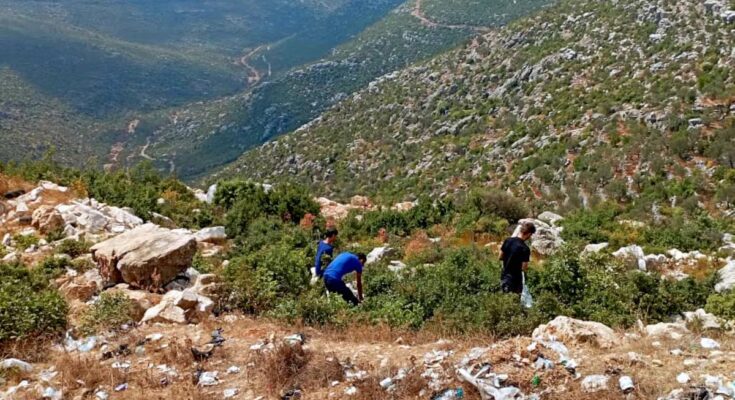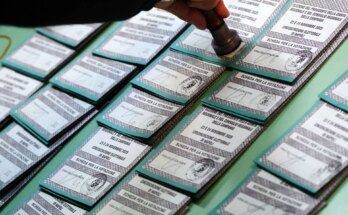Jihad sits at the entrance of his home in Darmin, eastern Syria, a short distance from the laurels that took his children. The 71-year-old man begins to speak before anyone asks him to and his grief overflows. “We left at dawn and returned at sunset, loaded with bags of bay leaves,” he begins with a firm voice that little by little begins to fade. “We didn’t know who would return and who would stay in the forest,” he continues, the words seeming to freeze in his mouth.
In the mountainous areas of the Syrian coastal region, where there are important Alawite communities, bay leaves are today more than just an aromatic herb or the raw material for the famous Aleppo soap. Since the fall of Bashar El Assad’s regime in December, many in these forests have been forced to choose between risking their lives or seeing their children starve to death.
Eyad remembers the moment he had to choose between the harvest and life. This 42-year-old man, born in the village of Zama, near Jableh, in the east of the country, had been filling a bag with bay leaves all day when the shooting started. “I was undecided whether or not to throw the bag, even in the midst of the bullets. I was terrified of returning for the second day in a row and looking at my children knowing that I hadn’t found a way to buy food,” he recalls. He eventually ran away without the bag. But he returned the next morning to collect the laurel in the same place.
Between March 7 and 9 this year, after the fall of Assad, there was a wave of killings committed by Sunni fighters against Alawite Shiite communities on Syria’s Mediterranean coast. The violence began a day after a rebellion by former officers loyal to the deposed president that the government said left 200 members of the security forces dead.
Also since then there have been masked gunmen chasing collectors. In April and May the attacks intensified, and in June at least four people were killed in a single execution by unidentified gunmen. According to testimonies from the victims’ families and local witnesses, the authorities offered no explanations, no arrests were made and the results of the investigation were not reported. The victims are not soldiers or activists, but rather former Alawite civil servants, workers, teachers or parents.
In July, a Syrian government commission of inquiry revealed that 1,426 people had been killed in March during attacks on security forces and subsequent massacres of Alawites.
The victims are not soldiers or activists. Only former public employees, workers, teachers or Alawite parents.
Two euros a day of work
Until 2011, laurel harvesting was another part of Syria’s agrarian economy, linked to the tradition of soap making. The war changed the situation and the fall of the regime accelerated everything.
According to data provided to the press by the Ministry of Agriculture, in the coastal regions of Syria, in the Ghab plain and in Masyaf, there are between 60,000 and 70,000 hectares of wild laurel forests. Only about 15% of that area is harvested. Annual production varies between 15,000 and 20,000 tons of fresh leaves, of which only 10% is exported. The rest circulates in local markets at very low prices, unfortunately for collectors.
A full day of collecting and carrying leaves across steep mountainous terrain brings in around 25,000 Syrian pounds, or around two euros. For families left jobless in the administration during the wave of layoffs that began nearly a year ago, it is the only option.
In a modest house in a village near Jableh, Umm Hassan holds a photograph of her smiling husband. “I worked from dawn to dusk and earned just enough to buy bread,” he says almost in a whisper, as if the words themselves were dangerous. “On the last day he left laughing with his children. Hours later, they carried him on their shoulders, dead.”
Children in the mountains
Hamza staggers along a mountain path, a white bag almost the size of his 12-year-old body slung over his shoulder. His legs tremble slightly from the weight, but he continues walking. “I’m here picking bay leaves. Without them we would starve,” he replies when asked why he doesn’t go to school. “When my father worked, I didn’t come here. I learned what bay leaves were when he was fired, like all our relatives. Today we all go to the mountains,” he adds.
When my father worked, I didn’t come here. I learned what bay leaves were when he was fired from work, like all our relatives
Hamza, working boy
His words, too mature for his age, condense the drama of an entire generation. Children who should be in class today climb dangerous slopes and tear leaves with their small hands as they watch armed men hide in the trees.
Abu Fuad, 55, sits in his small shop in central Latakia, surrounded by bags full of bay leaves. He knows well that the system is not fair. Collectors sell a kilo of dried laurel for 7 thousand Syrian pounds, just over 54 euro cents. If the lot has too many branches the price drops to £3,000 a kilo, around 23p.
“We buy from locals at low prices. I know they work hard for days in the forest to get a product that doesn’t give them enough to buy food,” he says in a dull, resigned tone. “But the market is ruthless and we also have to sell at the price set by the exporters.”
From his shop, the leaves begin a journey through small workshops linked to wholesale distributors, until they end up transformed into the famous soap of Aleppo Bay or in shipments that are exported to cosmetic and pharmaceutical companies abroad. The final product achieves very high prices on international markets. But that money never goes back to the mountain.



